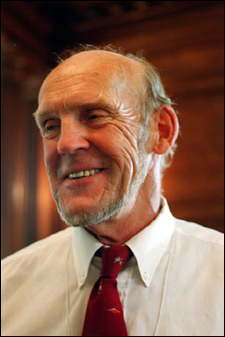Administrative prize honors four
Recipients of FAS prize are ‘surprised,’ ‘amazed,’ happy

To Marcia Morgan, receiving the Faculty of Arts and Sciences (FAS) Administrative/Professional Prize “was a huge surprise.”
Harry Parker experienced “amazement, bordering on disbelief.”
Susan McGee is still in shock, and Georgene Herschbach had nominated someone else for the honor.
Founded by an anonymous Harvard College alumnus and his wife and bestowed every other year on FAS administrators with five or more years of service, the FAS Administrative/Professional Prize is truly unique: The prize grants administrators $6,250 and four weeks of paid time off in which to use it.
“This award is really a strange one,” said Dean of FAS William C. Kirby, the Geisinger Professor of History, at a celebration for the winners at Phillips Brooks House Friday (May 21). “It identifies the people the faculty need the most and then sends them away.”
The prize is also unusual in that it awards administrators money and time, gifts more commonly conferred to faculty members through research grants and sabbaticals. And, this year’s winners agree, the prize brings the less tangible but perhaps more valuable benefit of honor and recognition.
“In my mind, it’s an honor that I share with others in my division, because they help me do what I do,” said McGee, who is registrar at the Division of Continuing Education, where she has worked since 1975. Swarmed by her colleagues and family at the celebration, McGee admitted that she didn’t know how or where she’d use her prize, but she anticipated taking a long vacation next summer.
Parker’s family, on the other hand, overflows with ideas for trips. Costa Rica is “plan A,” said the legendary men’s heavyweight crew coach, but his 9-year-old daughter Abigail is lobbying for the North Pole. “I think it would be cool to write ‘what I did on my summer vacation’ about it,” she said.
Parker, a former Olympian who has led Harvard oarsmen to the highest

achievements in rowing since he assumed the program’s leadership in 1963, attributed his receiving the prize to longevity. “That’s what we rowers pride ourselves on, endurance, persistence,” he said.
“He really has altered the history of athletics at Harvard,” said Kirby.
Despite her 22-year career in the Admissions Office, department administrator Marcia Morgan never imagined she would be tapped for the prize. “I’ve been here forever, but it was still a huge surprise,” she said. In her nomination letter, Director of Admissions Marlyn McGrath Lewis credited Morgan for ensuring the integrity of the 20,000 applications the office receives annually with “zero tolerance for errors.”
“She determines who will be a freshman and who will not, and she’s never made a mistake,” quipped Kirby. Morgan anticipates using the prize to take her first-ever trip to Europe with her husband.
Dean of Harvard College Benedict H. Gross described Herschbach, associate dean of Harvard College, as “the best kind of administrator, one who does whatever needs to be done.” Indeed, the Jill of many administrative trades served both the college curricular review and the task force on mental health with her time and talents this past year. With the shortest Harvard career among this year’s winners, at just 21 years, Herschbach did not expect the prize and had in fact nominated someone else for the honor.
“I work among some wonderful colleagues. I never believed it would be me,” she said.
Cuba tops Herschbach’s vacation wish list, although she and her husband, the Frank Baird Jr. Research Professor of Science Dudley Herschbach, are still poring over guidebooks to other destinations. “We’re still planning and that will be much of the fun,” she said.




